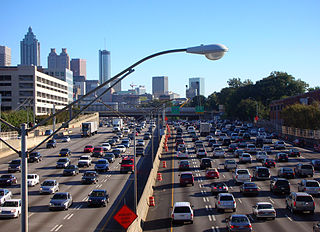
Recycling is the process of converting waste materials into new materials and objects. This concept often includes the recovery of energy from waste materials. The recyclability of a material depends on its ability to reacquire the properties it had in its original state. It is an alternative to "conventional" waste disposal that can save material and help lower greenhouse gas emissions. It can also prevent the waste of potentially useful materials and reduce the consumption of fresh raw materials, reducing energy use, air pollution and water pollution.
Environment and Climate Change Canada, is the department of the Government of Canada responsible for coordinating environmental policies and programs, as well as preserving and enhancing the natural environment and renewable resources. It is also colloquially known by its former name, Environment Canada.

Illegal dumping, also called fly dumping or fly tipping (UK), is the dumping of waste illegally instead of using an authorized method such as curbside collection or using an authorized rubbish dump. It is the illegal deposit of any waste onto land, including waste dumped or tipped on a site with no license to accept waste. The United States Environmental Protection Agency developed a “profile” of the typical illegal dumper. Characteristics of offenders include local residents, construction and landscaping contractors, waste removers, scrap yard operators, and automobile and tire repair shops.
Dorchester Shores Reservation is a Massachusetts state park consisting of three non-contiguous areas totaling 44 acres (18 ha) along the eastern edge of the Dorchester section of Boston. The area is composed of beaches and a park along the extended mouth of the Neponset River: Savin Hill/Malibu Beach, Tenean Beach, and Victory Road Park. Savin Hill is adjacent to Malibu Beach and has been restored to its original Olmsted Brothers design. The reservation is managed by the Department of Conservation and Recreation.

The New Jersey Department of Environmental Protection (NJDEP) is a government agency in the U.S. state of New Jersey that is responsible for managing the state's natural resources and addressing issues related to pollution. NJDEP now has a staff of approximately 2,850.

The New York State Department of Environmental Conservation is a department of New York state government. The department guides and regulates the conservation, improvement, and protection of New York's natural resources; manages Forest Preserve lands in the Adirondack and Catskill parks, state forest lands, and wildlife management areas; regulates sport fishing, hunting and trapping; and enforces the state's environmental laws and regulations. Its regulations are compiled in Title 6 of the New York Codes, Rules and Regulations. It was founded in 1970, replacing the Conservation Department. and is headed by Basil Seggos.
There is no national law in the United States that mandates recycling. State and local governments often introduce their own recycling requirements. In 2014, the recycling/composting rate for municipal solid waste in the U.S. was 34.6%. A number of U.S. states, including California, Connecticut, Delaware, Hawaii, Iowa, Maine, Massachusetts, Michigan, New York, Oregon, and Vermont have passed laws that establish deposits or refund values on beverage containers while other jurisdictions rely on recycling goals or landfill bans of recyclable materials.
Waste oil is defined as any petroleum-based or synthetic oil that, through contamination, has become unsuitable for its original purpose due to the presence of impurities or loss of original properties.

The United States produced 5.2 billion metric tons of carbon dioxide equivalent greenhouse gas (GHG) emissions in 2020, the second largest in the world after greenhouse gas emissions by China and among the countries with the highest greenhouse gas emissions per person. In 2019 China is estimated to have emitted 27% of world GHG, followed by the United States with 11%, then India with 6.6%. In total the United States has emitted a quarter of world GHG, more than any other country. Annual emissions are over 15 tons per person and, amongst the top eight emitters, is the highest country by greenhouse gas emissions per person. However, the IEA estimates that the richest decile in the US emits over 55 tonnes of CO2 per capita each year. Because coal-fired power stations are gradually shutting down, in the 2010s emissions from electricity generation fell to second place behind transportation which is now the largest single source. In 2020, 27% of the GHG emissions of the United States were from transportation, 25% from electricity, 24% from industry, 13% from commercial and residential buildings and 11% from agriculture. In 2021, the electric power sector was the second largest source of U.S. greenhouse gas emissions, accounting for 25% of the U.S. total. These greenhouse gas emissions are contributing to climate change in the United States, as well as worldwide.

The environment of Florida in the United States yields an array of land and marine life in a mild subtropical climate. This environment has drawn millions of people to settle in the once rural state over the last hundred years. Florida's population increases by about 1,000 residents each day. Land development and water use have transformed the state, primarily through drainage and infill of the wetlands that once covered most of the peninsula.

The California Environmental Protection Agency, or CalEPA, is a state cabinet-level agency within the government of California. The mission of CalEPA is to restore, protect and enhance the environment, to ensure public health, environmental quality and economic vitality.

The Florida Department of Environmental Protection (FDEP) is the Florida government agency responsible for environmental protection.
The California Department of Resources Recycling and Recovery is a branch of the California Environmental Protection Agency that oversees the state's waste management, recycling, and waste reduction programs. CalRecycle was established in 2010 to replace the California Integrated Waste Management Board. It is known for administering the California Redemption Value (CRV) program, among other responsibilities.
The Massachusetts Executive Office of Energy and Environmental Affairs (EOEEA) is a Cabinet-level agency under the Governor of Massachusetts. EOEEA is responsible for promoting efficient energy use throughout the Commonwealth while protecting and preserving Massachusetts' natural environment.

John C. Dernbach is a nationally and internationally recognized authority on sustainable development, climate change, and environmental law. He is Commonwealth Professor of Environmental Law and Sustainability at Widener University Commonwealth Law School and Director of its Environmental Law and Sustainability Center.

Source-separated organics (SSO) is the system by which waste generators segregate compostable materials from other waste streams at the source for separate collection.

Regina McCarthy is an American air quality expert who served as the first White House national climate advisor from 2021 to 2022. She previously served as the thirteenth Administrator of the Environmental Protection Agency from 2013 to 2017.
The Massachusetts Bottle Bill is a container-deposit legislation dealing with recycling in the United States that originally passed in the U.S. state of Massachusetts in 1982 as the Beverage Container Recovery Law. Implemented in 1983, the law requires containers of carbonated beverages to be returnable with a minimum return value of $0.05. The bottle bill does not cover containers of non-carbonated beverages like water, tea, or sports drinks. The law also establishes the handling fee paid by distributors to redemption centers, $0.0325 per unit as of July 5, 2013, and to retailers $0.0225 per unit. As the number of non-deposit beverage containers has increased to represent over one-third of beverage containers sold, the Bottle Bill has no influence on these non-deposit containers, with the result that these containers are three times more likely to be found as litter in Massachusetts communities. Additional studies indicate that beverage containers covered by the state's container deposit system are redeemed at approximately 70% and another 9% are recycled via curbside programs. Conversely, containers that are not covered, such as bottled water, juices, and sports drinks, are recycled at approximately 25%.
The West Virginia Department of Environmental Protection is a government agency of the U.S. state of West Virginia.

Climate change litigation, also known as climate litigation, is an emerging body of environmental law using legal practice to set case law precedent to further climate change mitigation efforts from public institutions, such as governments and companies. In the face of slow politics of climate change delaying climate change mitigation, activists and lawyers have increased efforts to use national and international judiciary systems to advance the effort. Climate litigation typically engages in one of five types of legal claims: Constitutional law, administrative law, private law (challenging corporations or other organizations for negligence, nuisance, etc., fraud or consumer protection, or human rights.













